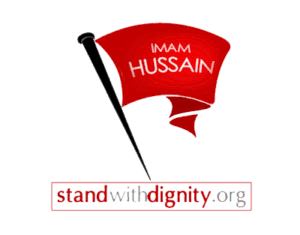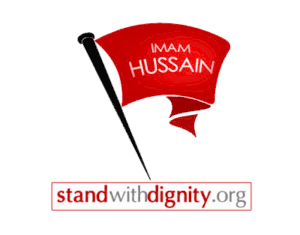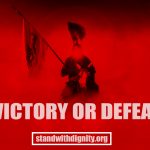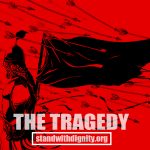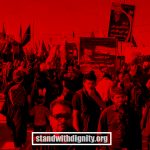By Nasir Shamsi
THE TRAGEDY OF KARBALA
The Tragedy of Karbala, for the past fourteen centuries, has stood as a torch-bearer to humanity and as a reminder of the heroic struggle of Imam Hussain (a), the grandson of Prophet Muhammad (s) against the Umayyad tyrant, Yazid. This great struggle, in the year 680 A.D., led to martyrdom of Imam Hussain and his 72 companions, who laid down their lives (in 680 A.D.), to uphold the ideals of truth and justice and to protect the religion of God.
RELIGION OF GOD
The religion of God changed hands from his Prophets Adam, Noah, Abraham, Moses, Jesus; it finally attained perfection at the hands of the Prophet of Islam, Muhammad (a descendant of Abraham), who was born in 571 A.D. Islam was not a new religion, but a repository of all revealed scriptures and the principles and ideas of the preceding Prophets.
TEACHINGS OF ISLAM
The teachings of Islam laid down in the Last Revealed Book of God, Quran, and propagated by Prophet Muhammad (s) are:
- There is One and only One God, Allah
- He sent all his Prophets to guide humanity, which include Abraham, Moses, and Jesus, to perfect and continue their endeavors. He sent Muhammad as his last messenger, and the Holy Quran, the word of Allah, was revealed to him.
- The dead shall be made alive on the Day of Judgment, when everyone shall be judged by his actions in the present life and rewarded or punished accordingly.
IGNORANCE vs. GUIDANCE
The Prophet was born in an environment that was completely immersed in evil. People worshipped idols, ate dead animals, practiced immorality, buried their girl infants alive as unwanted liability, deserted their families, violated covenants, the stronger among them oppressing the weak. So abysmal and dark was the condition of the Arabs, when Prophet Muhammad summoned them to Allah! He called upon them to discard the idols of stone that they worshipped in ignorance, and to worship One and only One God, without assigning partners with Him.
He also commanded them to be truthful in talk, to render to others what was due to them, to stand by their families, and to refrain from doing wrong and shedding blood. He forbade them from committing sins, bearing false witness, depriving orphans of their legitimate rights, and speaking ill of chaste women. He promoted the observance of prayers, fasting, and contribution to charity.
The fierce opposition to the Prophet’s message of peace (Islam in Arabic means peace) was spearheaded, among other tribes, by the Umayyads, who in their ignorance considered the prophet hood of Muhammad as the supremacy of the ‘Hashimite’, the Prophet’s family, who they had always resented. When Islam, for its egalitarian and universal appeal, and for its emphasis on justice and equality, came to be accepted by the masses, far and wide, over a period of 23 years of Prophet’s hard work, his enemies – led by the Umayyads- went underground, some of them pretending they had submitted to God.
TURN OF EVENTS
Soon after the Prophet’s death, the Umayyads managed to capture power, and Yazid was illegally installed as the ruler. Brought up in immoral and irreligious surroundings, Yazid abhorred discipline in any form. He exhorted people to shun religion, and openly ridiculed the Holy Commandments. The weak in faith gravitated towards Yazid for the liberal rewards, while others turned towards the grandson of the Prophet, Imam Hussain, son of the Prophet’s daughter, Fatima, and Ali, the Commander of the Faithful.
Determined to avenge the Umayyads, and to give himself the semblance of a legitimate caliph of Islam, Yazid issued orders that allegiance must be obtained from the grandson of the Prophet. Imam Hussain was fully aware of the wicked designs of Yazid. His allegiance, he knew, would mean consent to all the immoral and irreligious activities unleashed by this wicked ruler who had imposed his unlawful rule on the Muslim Umma. He therefore refused to give allegiance to Yazid. The struggle that followed was to become forever a symbol of a Challenge of Good against Evil.
HUSSAIN AND JESUS – VICEREGENTS OF GOD
Professor Arnold Toynbee, while comparing some twenty civilizations in his ten volumes of ‘A Study of History ’, concludes that societies and civilizations develop under the guidance of a very small group of leaders, even a single person. The world has not been without the brave and the fearless among men who, to uphold truth, justice, and righteousness, stand out in the crowd, to deliver a people from chaos.
According to Professor Toynbee, when a society deteriorates and degenerates and it looks to be beyond any hope of reform, God decides to send ‘His Man’, who in all his behavior and conduct reflects God’s own qualities, His virtues and traits, so much so that it seems “as if God Himself has descended on Earth in the garb of a man”, in order to redeem (and save) humanity. Christ and Hussain, Toynbee says, were such vicegerents of God, ordained to dispel evil and vice from their contemporary societies.
Rightly so, the Imam of the Faithful launched a most effective battle against the evil of his time. In this battle of “Right” and “Wrong”, apparently he lost – even his life and the lives of his kith and kin. But when the dust wistfully settled on the brave and bloodstained bodies of these valorous ‘Soldiers of Humanity,’ a fine distinction between “Right” and “Wrong” had made itself manifest and through his supreme sacrifice the Imam had achieved his noble goal to uphold justice and preserve Deen against heresy.
A poet has said,
Is Hussain dear to Muslims alone?
He is the Meteor on the horizon of humanity
Let humanity wake up to his clarion call
Every nation will say, “Hussain is ours.”
Very true, Hussain is eulogized by both Muslims and non-Muslims for his piety and perseverance, his unbreakable will, his unshakable stand against oppression and his ability to inspire the weak to stand up for their right.
According to Edward Gibbon, “In the history of Islam, the life of Imam Hussain stands unique, unapproached and unapproachable by anyone. Without his martyrdom, Islam would have been extinguished long ago. He was the savior of Islam and it was due to his martyrdom that Islam took such a deep root, which it is neither possible nor even even imaginable to destroy now”.
